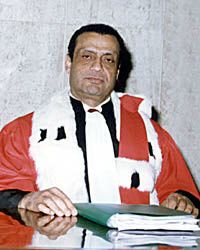 |
| Vol. 2 No. 8 | Table of Contents MEIB Main Page | 5 September 2000 |
| | Adnan Addoum Lebanese Prosecutor-General |
 |
| Adnan Addoum |
Lebanese Prosecutor-General Adnan Addoum is the most powerful figure in the Lebanese justice system, overseeing all prosecutors and investigating magistrates in Lebanon. His role in prosecuting opponents of the Syrian occupation, stalling legal proceedings against pro-Syrian elites and intimidating legislators makes him an integral pillar of Syrian authority in Lebanon.
Adnan Addoum was born in 1941 in the Mussaitbe Quarter of Beirut. His father was a Syrian national who emigrated to Lebanon and was later naturalized as a Lebanese citizen in the 1950's (aside from one of his uncles, the rest of Addoum's paternal relatives still live in northern Syria). His mother was born in Hosh Al-Abeed, North Lebanon. His parents owned a store in Souk Abou al-Nasr (Souk al-Lahamin) in the central district of the capital which sold imported Syrian meat and cheese. Addoum was raised both in Beirut and in Kaifoun in the Aley district, where his family owned a summer home.
Addoum studied law at the Lebanese University, from which he graduated in 1965 and enrolled in the Judicial Learning Institution to train as a judge. In 1971, he was assigned as the district criminal judge in Jdeidet el-Metn. In 1982, he was appointed as a general appellate lawyer in the south. Addoum served as head of the Beirut Bankruptcy court from 1990 until 1994, when he was put in charge of the criminal court in Baabda.
In June 1995, Addoum was appointed prosecutor-general (a position roughly equivalent to the attorney-general in the American judicial system) after the personal intervention of Gen. Ghazi Kanaan, the head of Syrian military intelligence in Lebanon. Another more senior and qualified judge, Ahmad Maalem, was originally in line for this job (in fact, a decree by the Lebanese cabinet had already been drafted for his appointment) before Kanaan intervened.
Although his position is nominally accountable to the Ministry of Justice, Addoum regularly reports to both Kanaan and Col. Rustom Ghazali, the head of Syrian military intelligence in Beirut. Whereas government ministers have come and gone over the past five years, Addoum has remained firmly established in his position and it is well-known that no one in the Lebanese government has the power to remove him. He is an integral component of Syrian authority in Lebanon, performing three vital services:
First, Addoum has aggressively prosecuted and imprisoned many political dissidents opposed to the Syrian occupation of Lebanon. Addoum's willingness to contravene internationally-accepted judicial standards in his pursuit of Syria's enemies has been documented extensively in reports by Amnesty International and other human rights organizations.1
Second, Addoum has the power to intervene directly in court cases that involve pro-Syrian political elites or might otherwise embarrass the Syrian regime. even if they technically fall outside of his jurisdiction. For example, Addoum interfered and indefinitely stalled a lawsuit filed by attorney Jihad Fadil against Interior Minister Michel al Murr and Colonel Maroun Abou Diwan charging them with abuse of power. Addoum has also effectively blocked lawsuits by relatives of Lebanese detainees illegally held in Syrian prisons.
Third, Addoum plays a key role in exerting Syrian influence over the Lebanese parliament because he has the power to initiate proceedings to lift the parliamentary immunity of MP's and subject them to criminal prosecution. The mere threat of such action by Addoum (or, more often, by anonymous "judicial sources" quoted in the press) is frequently sufficient to silence even the most unruly MP.
In October 1999, the head of the Judicial Investigative Committee, Judge Walid Ghamra, issued a report detailing numerous illegal transgressions by Addoum, particularly his practice of interrogating suspects without due process and authorization. However, the report was ignored by high-ranking members of the Lebanese government and the matter quickly disappeared.
Like many other high-ranking Lebanese officials, Addoum has amassed considerable wealth over the last five years. According to a reliable source, his financial assets, worth about $5-6 million, are held in secret bank accounts and real estate registered in the names of proxies.
1 See, for example, Antoinette Chahin: Torture and Unfair Trial, Amnesty International (AI Index: MDE 18/16/97), June 1997.